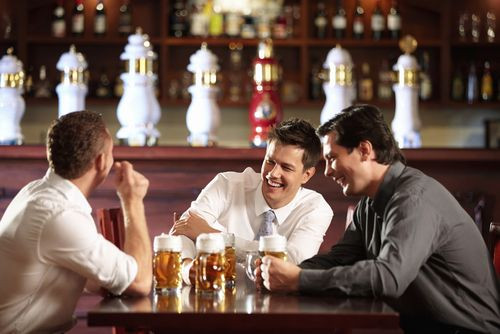Socializing In Pubs Boosts Men’s Mental Health; Drinking With Friends Offers Safe Place To Express Emotions

At the end of a long night of drinking, alcohol and emotion tend to flow in equal measure. Our inhibitions fall, our true feelings emerge. Sometimes this ends in hair pulling and bloody noses, but most of the time it’s sincere and heartfelt. A new study gives experimental backing to the phenomenon, as middle-aged men — a group too often isolated from much socialization — were found to have better mental health when they drank in pubs with their friends.
The finding may seem obvious on its face — who would argue friendship makes us unhappy? — but there are deeper implications here. A wealth of studies have shown that men routinely feel compelled to suppress emotion, fearing embarrassment that they’ll be seen as unmanly or weak. But emotional expression is important to one’s mental health, and a pub (or bar, for the Yank) serves as a setting for that expression. Men who drink with their friends see the space as safe, and as a way to broach otherwise taboo topics.
Not So Fast…
Of course, the downsides should be made explicit. Drinking heavily in order to foster feelings of community can do serious physical damage to a person’s body. “Drinking together in the pub may be a positive way for men to build relationships and seek support from each other, as long as this isn’t at the expense of a damaged liver or other,” Dr. Evelyn Gillan, chief executive of Alcohol Focus Scotland, told The Scotsman. Gillan added this risk is compounded by the fact men die earlier, on average, as a result of heavy drinking than women, and particularly in middle-age.
To conduct their research, a team from the Medical Research Council in the UK gathered data from 15 focus groups of mixed sex. The present analysis, however, focuses on 22 men between the ages of 28 and 52 years old. The team found a range of behaviors that were deemed socially acceptable within the confines of the drinking circle, yet showed no expression — active suppression, even — in other contexts.
One of the foundational behaviors of the groups was buying rounds. Men tended to believe that ordering a lone drink for oneself was altogether foreign and mostly snobbish. Drinking meant socializing, which required sharing. “You buy someone a drink and they buy you one back,” study leader Dr. Carol Emslie told The Scotsman.
What really interested Emslie and her research team was that talks of mental health arose organically from the men themselves. None of the researchers asked if drinking served to boost the men’s moods, Emslie explained. “I did not ask about mental health. This they raised themselves.”
“There is a stereotype that men are strong and silent about their mental health, and it is something they never talk about,” she continued. “This wasn’t what we found. It was very much the idea that alcohol or drinking in these communal groups had this positive effect on your mental health.”
Men frequently reported increased feelings of looking out for one another, opening up as a result of laughing and joking, and feeling compelled to uplift each other in the process. They also tended to acknowledge the health benefits of heavy drinking on their bodies but said the benefits afforded by drinking’s social aspects outweighed the negatives.
Prior research has shown that these upsides may in fact outweigh the downsides in middle-aged men. A study performed early last year showed that men in their fifties and sixties, nearing retirement, led increasingly isolated lives and tended to feel lonelier as a result. Worse, they faced lower mortality rates than men who continued to remain social.
Making Social Drinking Healthier
According to Emslie, the study sets a firm foundation for later analyses of male interaction, as one can’t fully understand male interactions and feelings of masculinity without first understanding how and where both are manifested. “The way that men talked about looking after each other is something we could build on in terms of interventions,” she said. This, arguably, is much easier than trying to change an entire culture’s view of emotional masculinity.
Currently, Emslie is working on a way to combat the physical toll of drinking by sending cartoon text messages to men as a way to dissuade hazardous binge drinking. “It is a little bit of a nudge rather than beating people over the head,” she said.
Source: Emslie C, Hunt K, Lyons A. The role of alcohol in forging and maintaining friendships amongst Scottish men in midlife. Health Psychology. 2013.



























